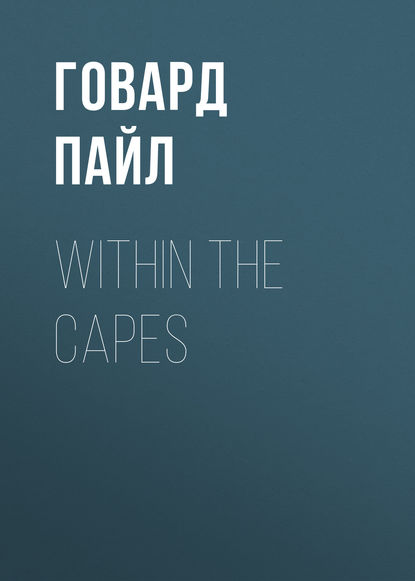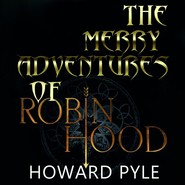По всем вопросам обращайтесь на: info@litportal.ru
(©) 2003-2024.
✖
Within the Capes
Настройки чтения
Размер шрифта
Высота строк
Поля
“A nasty row, wasn’t it, sir?” said he to Tom, jerking his head toward the captain’s cabin.
Tom made no answer; in fact, he did not look at the man, for it was none of the fellow’s business.
Presently the dory came alongside, and the pilot slid down the man-ropes and stepped cleverly into her.
By noon the Nancy Hazlewood had dropped Cape May astern. The captain had sent for Jack to come upon deck again, to take his watch at eight bells. Captain Knight had directed her course to be laid S. E. by E., by which Tom supposed that he intended to run well out, so as to escape the chance of falling in with any of the British cruisers that were at that time hanging about the coast, more especially off the mouth of the Chesapeake. The wind was nearly astern, every inch of cloth was spread, and the way in which the Nancy Hazlewood boomed along showed Tom Granger that he had not overrated her sailing qualities. The log showed that she was running at a little over eleven knots.
All of the afternoon Tom was in the forward part of the vessel, looking to the clearing away of a lot of stores, for they were getting things to rights as well as they could, and taking advantage of the fair weather to do it.
And it was very needful, too, for, beside spare suits of sails and spars, lashed to nothing, there was a great litter of miscellaneous stores, – barrels of salt pork, junk, hard-tack, and flour, kegs, chests, crates, yeoman’s and purser’s stores, and a hundred and one things – too many to tell of.
Tom could not help wondering, as he looked at this mass of stores, what they should do if it should be needful to man the guns for a fight, or work the ship in a sudden squall. However, no craft of any sort was in sight, and there was no sign of foul weather.
One of the worst features of the whole matter was the slowness with which they got along with the business of clearing up all this hamper; the work seemed to gather on them instead of growing less.
About the middle of the afternoon, Jack came to where Tom stood overseeing the men at this work. He stood beside him for some time without saying a word, looking moodily at them. Presently he spoke all of a sudden: “What do you say to it all, Tom?”
“I have nothing to say, Jack,” said Tom.
“You may have nothing to say,” said Jack, “but I have. Mark my words, Tom, if we’re caught in any sort of heavy weather we’ll founder as sure as my name’s Jack Baldwin!” So saying, he turned on his heel and walked quickly away. Tom could easily see that Jack felt touched at him because he did not show more feeling in the matter. But though Tom did not show it, his thoughts were uncomfortable enough in all conscience.
That day (the twenty-second), was as good a day as one could have wished for, and so was the next, – and that was the last, for then the trouble began.
CHAPTER VI
SO the 23d was the last fair day that they had on that short cruise. During the forenoon the wind held from nearly the same quarter – that is, northerly and westerly.
The air was mild and pleasant; the day, like the day before, seemed more like June than the middle of April.
Toward noon, however, the wind shifted around to the southward and eastward, and the glass had a downward bearing. Tom saw, with a troubled feeling, that the weather began to take an ugly sort of a look. About nine o’clock Captain Knight gave orders to have the vessel’s course altered to nearly due south.
At noon the observation showed their position to be about 35° 40′ north, by 71° west, with Hatteras about 210 miles distant, W. by S. on the starboard beam.
A little before eight bells, Captain Knight came up on deck again, and Tom, feeling anxious himself, looked out of the corners of his eyes, to see if he could gather what the captain thought of the situation. It seemed to Tom that he was not quite easy in his mind. He cast his eyes aloft, and then looked around. He took a turn or two up and down the deck, and then looked at the glass, which, as had been said, was falling. Whatever he might have thought about the looks of things, he said nothing. Tom had half expected an order to shorten sail, but Captain Knight gave none such, and presently went to his cabin again.
Shortly after noon the wind was blowing from the northeast. It became a great deal colder, and by four o’clock the sky was overcast by a gathering haze, which, at last, shut out the sun altogether.
About this time they fell in with shifting banks of fog, blowing before the wind, the like of which Tom had never seen before. They seemed to drift in belts, and were no doubt raised by cold currents of air, for a chill could be felt the minute the ship would run into one of them. Every now and then the wind would sweep these banks away, rolling them up before it, and for a little while there would be a clear space around the ship for maybe a couple of miles or more.
At that time they were under all plain sail to top gallant sails, and were booming along at a rate that could not have been less than ten knots. Tom thought that the Nancy Hazlewood might even have done better than she was then doing, were it not that she labored in a most unusual way for a vessel, in a wind no heavier than that in which she was then sailing. There is no doubt that this came from the heaviness of her spars as well as the ill stowage of her provisions and stores; still she was doing well, and any one could see with half an eye that it would be an uncommonly swift cruiser to whom the Nancy Hazlewood would not be able to show a clean pair of heels, if the need should arise for her doing so.
It was a little before the middle of the first dog watch, when there happened one of the closest misses that Tom ever had of losing his life. I most firmly believe that if any one beside Jack Baldwin had been the officer of the deck, Tom Granger’s story would never have had to have been told.
Jack was walking up and down on the poop in a restless sort of a way. It was plain that he was anxious at the fog, as well he might be. At one time the ship would be surging away across what seemed to be a lake, with dull banks of snow all around, at another she would plunge headforemost into whirling clouds of mist, so thick that the leaden sea alongside could barely be seen; heaving as though it were something alive, and the fog was smothering it.
Jack came to the break of the poop and looked over to where Tom was standing, on the deck below. His black hair and beard were covered with the dampness, so that he looked as though he had turned gray.
“Tom,” said he, “I wish you’d slip foreward and see that those men are keeping a bright lookout ahead. Keep your weather eye lifted too, Tom, till we’re out of the worst of this infernally thick fog.”
So Tom went foreward, as Jack had asked him to do, and found that the two men who had been placed there since they had run into the fog were keeping as sharp a lookout as could be wished for.
Just as Tom climbed up on the forecastle, they surged out into a clear space, that was maybe two miles or two miles and a quarter from side to side.
They had run pretty nearly across this stretch, and I recollect that Tom was just lighting his pipe under the lee of the foremast. As he raised his head and looked over the port bow, he saw a sight that made the blood stand still in his veins.
It was a man-of-war in full sail, looming up like a mountain.
It came out of the fog so suddenly, that it seemed as though the mist had taken form from itself. It was bearing straight down across the port bow of the Nancy Hazlewood, plunging forward as solemnly as death. It could not have been more than six or seven ships’ lengths distant, and the great sails bellying out like big clouds, shadowed over the Nancy Hazlewood as she might have shadowed over a fishing smack.
Ten seconds more and she would have been down upon them, and would have crushed the little craft as though she had been made of paper. There was a moment of silence as great as though every man aboard of the Nancy Hazlewood had been turned to stone. I remember that Tom Granger stood with his newly-lighted pipe in his hand, never moving a hair.
The silence was only for an instant, though, for the next moment a voice roared like a trumpet:
“Hard a starboard! Let go, head sheets and lee head braces!”
It was Jack Baldwin’s voice, and never did Tom hear it ring as it did at that moment. It not only was heard through the ship, but it pealed through it like a clap of thunder. Those below came tumbling up helter-skelter, and the captain came running out of his cabin, for there was a ring in Jack’s voice that told every man aboard of the ship that great danger was down upon them. It seemed to break the stillness around just as a stone dropped into a well might break the stillness below. In an instant the braces were flung from the belaying-pins, and the ship came up toward the wind without a second to lose. Before those aboard of the frigate had gathered their wits she had passed alongside, and so close that a child could easily have pitched a biscuit aboard of the Nancy Hazlewood from the decks that loomed twenty feet above her.
The whole thing was over in a dozen seconds, but those dozen seconds are stamped on Tom Granger’s mind as clearly as though they were chiseled in marble. Even now, though he is over eighty years old, he can see that great frigate rising higher and higher as she surges forward, towering over the little ship, while a hundred faces pop up above the rail and stare down upon her decks. It was only a moment – a thread of time – on which hung the chance as to whether she would clear or not. There was a thunderous roar of the waters under the bow, flung back in an echo from the wooden walls of the frigate; there was a vision of open ports rushing by, and of scared faces crowded at them, in spite of discipline; then the frigate was astern and the danger gone past with her. But in that short moment of passing they saw enough to make them know that she was a British cruiser.
I say again that if Jack Baldwin had not had the deck at that time there would never have been any story to tell of Tom Granger, for if Jack had hesitated only so much as two seconds, as I am afraid that Tom would have done in his case, the Nancy Hazlewood would have been run down just as sure as that there is a sun in the heavens.
So the danger went by, and all was over in a quarter of the time that it takes to tell it. The head-yards were braced up, the head-sheets were gathered aft, the Nancy Hazlewood stood away on her course again, and the next moment plunged into the fog and was gone.
But, in the meantime, they had wakened up aboard of the frigate, and just as the Nancy Hazlewood ran into the bank they heard an order shouted aboard of the man-of-war, sounding faint because of the distance that the two vessels had now run:
“Weather head, and main; lee cro’ jack braces!”
That meant that the frigate was about to wear, follow down in their wake and do that which she had so nearly missed doing a minute before – finish up the Yankee.
Tom came aft, and, though he would have felt like knocking the man down that would have said so at the time, his hands were cold and trembling nervously. For the matter of that, Jack Baldwin’s face was whiter than it was used to be. “A close shave, sir,” said he to Captain Knight, who stood beside him; but there was a nervous tremor in his voice in spite of the boldness that he assumed. Indeed, the only perfectly cool man aboard was Captain Knight. He stood looking aft, as though he would pierce the fog and make out what the vessel astern of him was about.
Presently he turned to Jack. “Did you not understand from that order that he was about to ware ship, Mr. Baldwin?” said he.
“I think that I understood them to give such an order, sir,” said Jack.
Captain Knight drew out his snuff box and took a pinch of snuff. “I understood it so,” said he, shutting the lid of the box with a snap and sliding it into his pocket again. He stood for about a couple of minutes looking, now up at the sails and now straight ahead; presently he turned to Jack again.
“Bring her by the wind on the starboard tack, Mr. Baldwin,” said he. “We’ll slip out of this neighborhood on somewhat the same course that the Englishman held a few minutes ago, and leave him groping about here in this infernal blindness for us.”
It seemed to Tom that Captain Knight had done a wise thing in taking the course that he did to get away from the Englishman. If the fog should lift, and they should find that the frigate had the weather gauge, they might get into a nasty pickle, whereas this course would give them the weather gauge and every chance to get away.
After a while Captain Knight told Jack to set the fore-topmast stay sail, and then, after some hesitation, to set the royals. It was quite plain that he had made up his mind to crack on sail, so as to gain as much to the windward of the frigate as he could.
The Nancy Hazlewood was now sailing close-hauled, and was as pretty a sight as one could wish to see. The wind was blowing stiffly, as it had done for some time. It had not increased to any account, though the scud was beginning to fly across the sky, and there was every prospect of its blowing heavily before morning. So the Nancy Hazlewood went bowling along on this wind, her bows every now and then flinging a roaring sea from her in an ocean of foam. She was careened over so that the sea eddied around the lee scuppers, and her copper bottom showed red in the green waters. On she went, bouncing from sea to sea, as a ball bounces when it is rolled across the ground. The top-gallant masts were bent like a bow, and the weather backstays were as taut as the bow-string, those on the lee bowing out gracefully before the wind. The cloud of sails were bellied big and round, and were as hard as iron, and altogether, as was said, the Nancy Hazlewood was as pretty a sight as one could wish to see.
About two bells in the first watch Captain Knight gave orders that the ship should be put about, and running two points free on the starboard tack, stood off to the S.E.
This, as has been said, was one of the narrowest shaves that Tom Granger ever had for his life, and as long as he shall remember anything he will never forget that half-minute when the British frigate was coming down upon them under full sail, with death at the helm.












